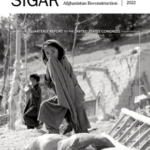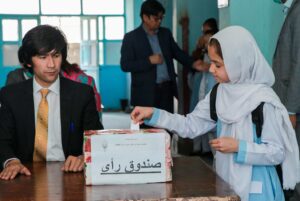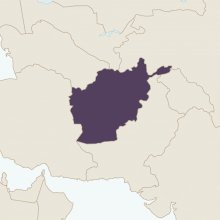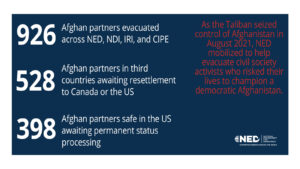“Those last two weeks of August were really a microcosm of much of the previous 20 years of the war in Afghanistan, in the sense that you had a situation where there did not appear to be a type of U.S. plan or strategy,” said Michael Kugelman, Deputy Director of the Asia Program at the Wilson Center in Washington.
A year on, Afghans are paying the price, reports suggest.
 On 20 July 2022, the UN Assistance Mission in Afghanistan (UNAMA) published a report that found that the Taliban had carried out human rights violations that affected 65 human rights defenders and 173 journalists and media workers, from 15 August 2021 to 15 June 2022, notes the International Federation of Human Rights (FIDH).
On 20 July 2022, the UN Assistance Mission in Afghanistan (UNAMA) published a report that found that the Taliban had carried out human rights violations that affected 65 human rights defenders and 173 journalists and media workers, from 15 August 2021 to 15 June 2022, notes the International Federation of Human Rights (FIDH).
The UN Human Rights Council at its upcoming session in September 2022, should establish an independent investigative mechanism to investigate, collect, and preserve evidence of all violations and abuses of international human rights law and international humanitarian law in Afghanistan, FIDH insists.
Since the Taliban took control, Afghans dedicated to a democratic future have faced a new level of danger, as the regime targets civil society leaders, advocates of women’s rights, journalists, artists, and other activists, including partners of the National Endowment for Democracy (NED).
 “It’s personal,” said NED President and CEO Damon Wilson. “NED has provided support for hundreds of civil society groups and human rights defenders in Afghanistan since 1984, NED’s first year in existence. Given these relationships, we could not sit back and watch this crisis unfold without doing everything possible to help our partners.”
“It’s personal,” said NED President and CEO Damon Wilson. “NED has provided support for hundreds of civil society groups and human rights defenders in Afghanistan since 1984, NED’s first year in existence. Given these relationships, we could not sit back and watch this crisis unfold without doing everything possible to help our partners.”
Coordinating with the Center for International Private Enterprise, the International Republican Institute, and the National Democratic Institute, NED mobilized an emergency response, including securing emergency funding and evacuating over 1,016 grantees and their families to the United States, Canada, and other countries. The Middle East and North Africa (MENA) program experts and other NED staff worked around the clock to field calls, collect data, rally networks, translate documents, and navigate security concerns to evacuate Afghan colleagues.
“The Taliban stopped one of the NED-organized convoys, but we later brought those people to safety,” said Brian Joseph, NED’s vice president of programs. “NED took a forward leaning, very high tolerance for risk approach to find solutions, mobilizing well before we had the authorizations. NED has never done anything like this evacuation before, and at the time, I wasn’t sure we could pull it off.”
 On the outskirts of Kabul in an area mostly populated by ethnic minority Hazaras, the Marefat High School (right) opened two decades ago to provide civic education to Afghan children, regardless of gender or ethnicity. In August 2021, when the Taliban took over Afghanistan, the school—a NED partner since 2002—was forced to adapt its teaching methods.
On the outskirts of Kabul in an area mostly populated by ethnic minority Hazaras, the Marefat High School (right) opened two decades ago to provide civic education to Afghan children, regardless of gender or ethnicity. In August 2021, when the Taliban took over Afghanistan, the school—a NED partner since 2002—was forced to adapt its teaching methods.
“The school administrators have received constant threats and phone calls, so we have decided to stop formal education for girls, which would be regarded as a sign of disobeying the Taliban rule,” says Aziz Royesh, founder of the school and a former NED fellow.
Jason Criss Howk, director and co-founder of Global Friends of Afghanistan, offers some ideas about future Afghan governance in The National Interest:
- First, it would be useful to find some neutral moderators for these discussions to keep them moving along and to referee the ideas. Right now, there is no structure guiding these discussions, meaning they have no end result. People are talking, but no one is making any impact or capturing the ideas for a future constitutional convention.
- Second, Afghans should start by outlining what they want to value in their future government. Trying to sell an entire political platform to other Afghans doesn’t seem to lead to any changes, and it often drives opponents even further into their own ideas. It is easy to get defensive when your opponents say their idea for the future government is perfect and ready to be executed, while all your ideas would destroy the country. I am not making this up; this is what is being said.
-

NDI
Third, find a key document that exists and work from it. In the centuries since the United States wrote its constitution, many nations and organizations have adopted the best ideas from it. …… If you start by using the Universal Declaration of Human Rights to determine what rights you want for all Afghans, many other ideas will flow from it. It was drafted by a team from many cultures and religions and is the global standard for human rights protection.
- Finally, listen twice as much as you speak about the future of governance. The most crippling problem I see in discussions is how sure every Afghan is that their idea is perfect and is the only way. Those who are not willing to listen, especially those who ignore the desires of Afghan women and girls, will only succeed in creating another failed governance model…..
 NED remains committed to maintaining a significant grants program supporting partners inside Afghanistan in their efforts to strengthen independent media, champion women’s rights, provide education for all children, and pursue a democratic future.
NED remains committed to maintaining a significant grants program supporting partners inside Afghanistan in their efforts to strengthen independent media, champion women’s rights, provide education for all children, and pursue a democratic future.
“Courageous individuals and organizations continue to risk everything to fight for an Afghanistan that respects civil liberties, human rights, and freedom for all people,” said NED’s Senior Director for MENA Amira Maaty.
NED will underscore its commitment to Afghanistan with two upcoming events: convening partners who evacuated to Canada in Calgary on August 20; and on September 8, gathering partners who evacuated to the United States in Washington, D.C.
In an undercover investigation into the Taliban’s crackdown on women (above), FRONTLINE correspondent Ramita Navai finds women who are being punished by the regime and confronts Taliban officials.
#Afghans have never tried a democratic experiment where the people get to elect all their leaders and vote them out if they fail, @jason_c_howk writes for @TheNatlInterest https://t.co/UlvbWmYblr
— Democracy Digest (@demdigest) August 10, 2022







